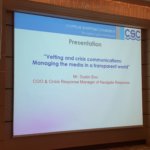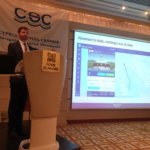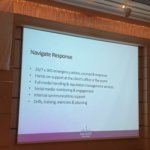CSC January’s Members Meeting
30.01.2019
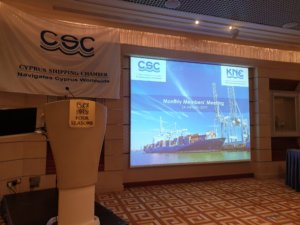
CSC January’s Members Meeting
On January 24, 2019, the first monthly meeting of the members of the Cyprus Shipping Chamber took place. As usually the Company was represented by its Director – Mr. Adam Barecki. The meeting was chaired by Mr. Andreas Neophytou, vice-president of the Chamber.
He started with a short breefeing. The most important information that was provided was related to the Cypriot tonnage tax system. As we all know, current regulations are in force until December 31, 2019. The Cypriot government, wishing to maintain the existing regulations after that date, must obtain the approval of the European Commission. This beneficial system in accordance with European law is treated as „state aid”.
State aid was formally introduced into European Union statute law by the Treaty of Rome where it classified state aid as being any state intervention that distorted competition law. The definition was later updated by the Treaty on the Functioning of the European Union in 2007. It stated that any aid given to a company by a state within the EU would generally be incompatible with the EU’s Common Market. Within the new law under the treaty, the first chapter of it defines what is not allowed to be done with state aid and the second chapter defines actions that can be done within legal limits.
- Save as otherwise provided in the Treaties, any aid granted by a Member State or through State resources in any form whatsoever which distorts or threatens to distort competition by favouring certain undertakings or the production of certain goods shall, in so far as it affects trade between Member States, be incompatible with the internal market.
It has been confirmed that by the end of January 2019 the Cypriot government will send a notification to the European Commission asking for the tonnage tax to be extended. Cyprus Shipping Chamber took an active part in the revision of the existing regulations and the process of creating the notification itself. The entire sector is looking forward to finalizing this matter. Let us hope that the Commission will accept the government proposal.
The second part of the meeting was devoted to the following topics: „Vetting and crisis communications: Managing the media in a transparent world”. For this topic, Mr Dustin Eno, COO & Crisis Response Manager of Navigate Response Ltd.
From public AIS vessel tracking websites to drones, shipping has never been more visible. The speed of news is increasing and the role of social media has changed the communications landscape. Ship operators are increasingly aware of the importance of effective media management for any vessel carrying their cargo and media preparedness is becoming a regular part of many vetting inspections. The presentation of Mr. Eno provided information on how a company , big or small, can ensure it is prepared.
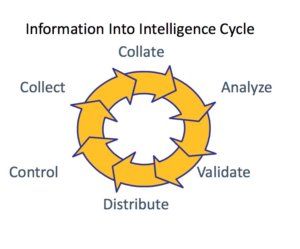
Business Continuity planners need to understand the “information to intelligence” cycle and to apply this to business continuity planning (this includes Crisis Management, Contingency Planning, Emergency Preparedness and Response Planning, Crisis Communications Planning, etc.). As depicted above: “Information to Intelligence Cycle” the process of turning information into actionable intelligence is critical to decision making. Planners need to recognize that the speed at which the cycle now moves in this social media driven age will cause discomfort for leaders not accustomed to making snap decisions, and angst for attorneys uncomfortable with the demand by the organization’s many stakeholders for rapid response and c
onstant, transparent communication.
Planners perform risk assessments, business impact assessments/analysis, SWOT (Strengths, Weaknesses, Opportunities, Threats) analysis and other types of information gathering and analysis. Unfortunately, most of these efforts are hampered by the time it takes to organize, conduct, analyze and report. Generally, by the time the assessment goes to press (report), the information contained therein is dated at best and useless at worst. Planners often work in silos rather than cross-functional teams, further impacting the value of disparate data that may present very different concepts if considered as a whole.
The ability to effectively respond to and manage the consequences of an event in a timely manner is essential to ensure an organization’s survivability in today’s fast paced business environment. With the emergence of new threats, such as post-truth, alternative facts, fake news, cybersecurity, terrorism, workplace violence, bio-terrorism; and the increasing exposure of organizations to traditional threats such as, fraud, systems failure, fire, explosions, spills, natural disasters, etc., an “integrated” approach to information capture and analysis is essential.
Summarizing, when a crisis strikes your company, you need to be able to react quickly and protect your reputation, your business and your position. In this matter an experienced specialists will be helpful. An essential element is to provide real-time, actionable critical intelligence from the most current available information.

